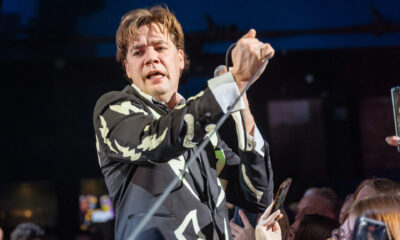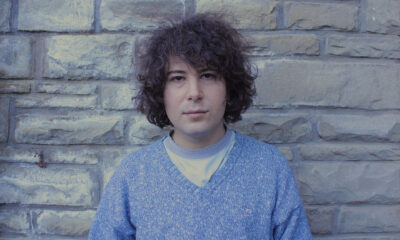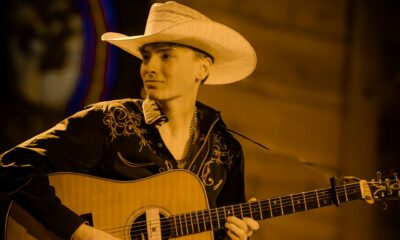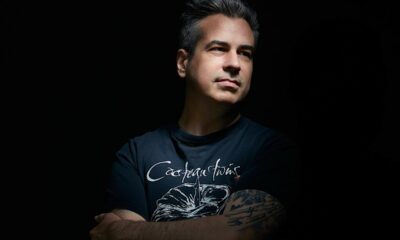Interviews
Interview with frontman Michael Tolcher
Singer Songwriter Michael Tolcher is finishing up a nationwide tour with pop group Hansen but that is not slowing him down. He will be entering the national television spotlight in the coming weeks. “Sooner or Later” from his latest release, I Am was chosen as the theme for ABCs new teen drama Life as we Know It. The show debuts on Thursday October 7th at 9:00pm.

Singer Songwriter Michael Tolcher is finishing up a nationwide tour with pop group Hansen but that is not slowing him down. He will be entering the national television spotlight in the coming weeks. “Sooner or Later” from his latest release, I Am was chosen as the theme for ABCs new teen drama Life as we Know It. The show debuts on Thursday October 7th at 9:00pm. Michael will also be making a guest appearance on the NBC hit drama series American Dreams. In addition to his busy schedule, Michael recently had the distinction of being chosen as spokesperson for the American Lung Association. I recently sat down with Michael on a break from the Hansen tour to ask him a few questions.
You began your career singing gospel in the Atlanta Federal Prison. Can you tell me a little bit about that experience and how it has affected your career?
Michael: Well, I wasn’t singing gospel, I was singing my own songs. It was my own songs and a couple of covers. It was definitely a real inspiring time for me. It wasn’t right when it started but it was right when I was getting going. I found the experience very encouraging because they (the inmates) were all very receptive and inspiring to me. You know I was like, wow, these grown men are not necessarily softies yet they are digging my music. So I figured if I could reach them I could reach anybody.
Along those same lines your bio states that this is where you met Dr. Mutulu Shakur, the father of the late Tupac Shakur. What impact did this have on your career? What impact did this have on you personally?
Michael: Well, you know as far as Rap goes Tupac was my favorite, I used to sing some of his songs in my set before I ever met his dad. So first of all I was like, Wow, I am meeting one of the closest people to my favorite rapper. So that part was really cool and on top of that he turned out to be a very wise man, a real philosopher. I mean it was like a friendship kind of thing, he was inspiring and expanded my own vision of what my music could be. It also helped me take a closer look at our correctional systems; you know getting to know those people. It’s more about punishment than rehabilitation. A lot of the guys gave me poems and essays; they could be very contributing to society if they ever had another chance. Most of them were serving life sentences and Mutulu is serving several life sentences.
Early on in your career you were an athlete. How did you make the switch to becoming a musician?
Michael: Before I was injured I had already started to play shows. But it was just became a simple choice. I needed something to go after, you know, I’ve always been that way, some kind of hobby, some kind of dream; music just became the next one. It happened right away because in ’96 when I played the Olympics it was the first time that I really considered that I could entertain people on a large scale.
What benchmarks do you use to determine when you’ve written a good song or to determine that a song is finished?
Michael: When I am all sweaty and get the chills, then I know that it is something that I am feeling. I then go back and fine tune it to make sure there are no holes in it.
You are a very unique artist in that you combine soulful melodies with a social consciousness. How has this affected your relationship with your fans? What message do you want them to walk away with after listening to your record?
Michael: Well, I think it covers both parts of it for me, that’s the dance element of music. I think a key part of it is being able to inspire people to dance because that was where I fell in love with music first. It just moved me in my seat; I used to break-dance and all. But as far as the meaning, I think it is kind of just sharing me and what I represent and even though it’s not fully developed yet, it is kind of an inspiration to give hope, make change and unite. Sort of an inspiration to pursue some of those positive dreams that we all share for our experience on earth. So, I guess if there is one message to take away I guess it would be hope in the human spirit that we are capable of fulfilling these visions that we have and of what life can be.
How do you think you have grown as a songwriter and a musician over the years?
Michael: I think I have grown a lot, I think moving out of Georgia really made me see myself in a new light as an artist instead of an athlete. But you know, I got a long way to go for sure, I got a lot of learning to do on the guitar and just honing in my own personal message, you know. I am sure as I grow older I will understand more about my own feelings and how to put them in a song.
Along those same lines are there any tracks on the album that are favorites of yours or that have a good story behind them?
Michael: Let’s see, I like “I Am” as a track because it took me about a month to learn what I was hearing in my head; as an artist that was a stretch for me. Usually as an artist I would write relatively within my own playing boundaries but that song rhythmically was a challenge. “I Am” is about acknowledging the human side and the spiritual side and trying to find a happy marriage between the two.
You are right in the middle of a nationwide tour with Hansen. What’s that like?
Michael: It’s really cool man, they have a young crowd, they’re excited, they jump up and down and scream, and Hansen themselves are great musicians; they put on a great show. I have kind of tailored my set to them and I have been playing some of the lighter pop stuff more but they dig it and sometimes they even get into the hard rock stuff. Overall, I find them to be very receptive.
The album was produced by Pop Roxx, what was that experience like? Were they heavily involved in it?
Michael: Yeah, they kind of opened my mind to programming and I guess since they did that it gave me some sort of versatility, because you can pretty much create whatever rhythm and sound you want to hear. They expanded my ears a little bit and they also really drove me to improve my writing. They also drove me to write bridges, because some of the songs didn’t have them.
What is next for Michael Tolcher?
Michael: I plan on continuing the tour and continuing to meet people and hopefully I can find some common ground at a show and just get down. [ END ]
-

 Alternative/Rock2 weeks ago
Alternative/Rock2 weeks agoThe Hives Bring Their Swedish Swagger to Leeds O2 Academy [Photos]
-

 Culture5 days ago
Culture5 days agoCirque Du Soleil OVO Takes Leeds Fans on a Unique, Unforgettable Journey [Photos]
-

 Hardcore/Punk4 days ago
Hardcore/Punk4 days agoHastings Beat Punks Kid Kapichi Vent Their Frustrations at Leeds Beckett University [Photos]
-

 Alternative/Rock3 days ago
Alternative/Rock3 days agoA Rejuvenated Dream State are ‘Still Dreaming’ as They Bounce Into Manchester YES [Photos]
-

 Indie5 days ago
Indie5 days agoMichele Ducci Premieres Bouncy New Single “You Lay the Path by Walking on it”
-

 Alternative/Rock6 days ago
Alternative/Rock6 days agoWilliam Edward Thompson Premieres His Stripped-Down “Sleep Test” Music Video
-

 Country1 week ago
Country1 week agoJayce Turley Reflects on “Misery” with the Premiere of His New Single
-

 Dance/Electronic2 weeks ago
Dance/Electronic2 weeks agoPerfect Female Type Premieres Synthwave Single “Science of Love”




